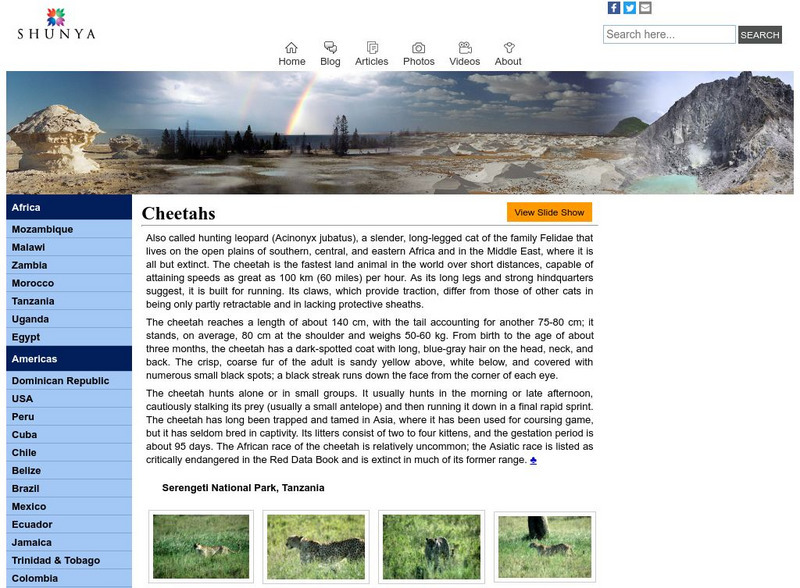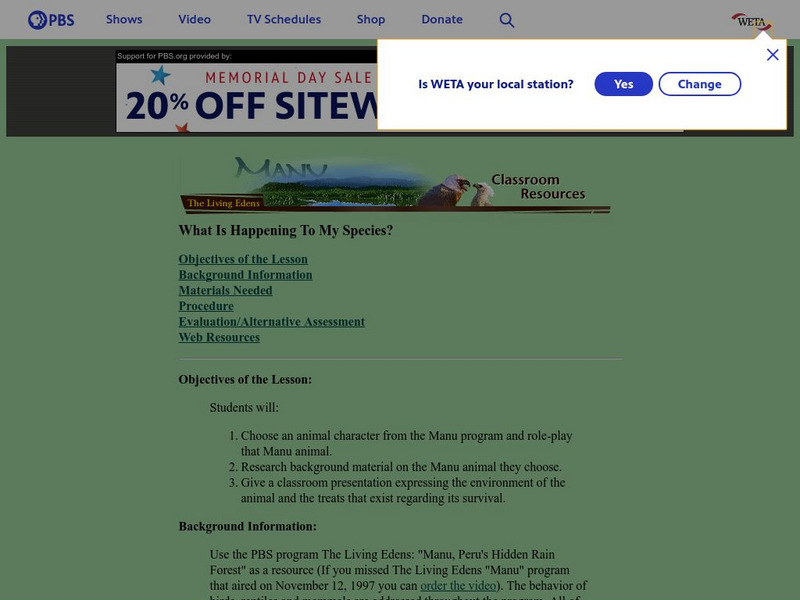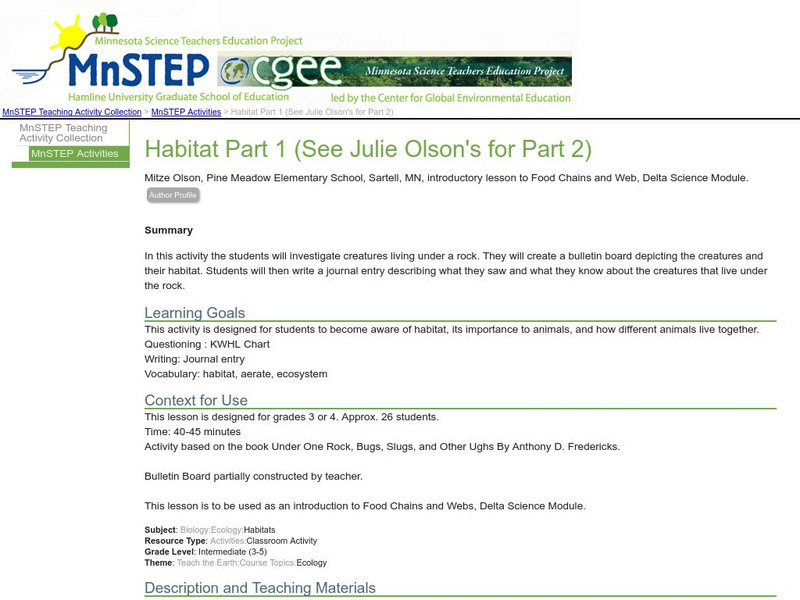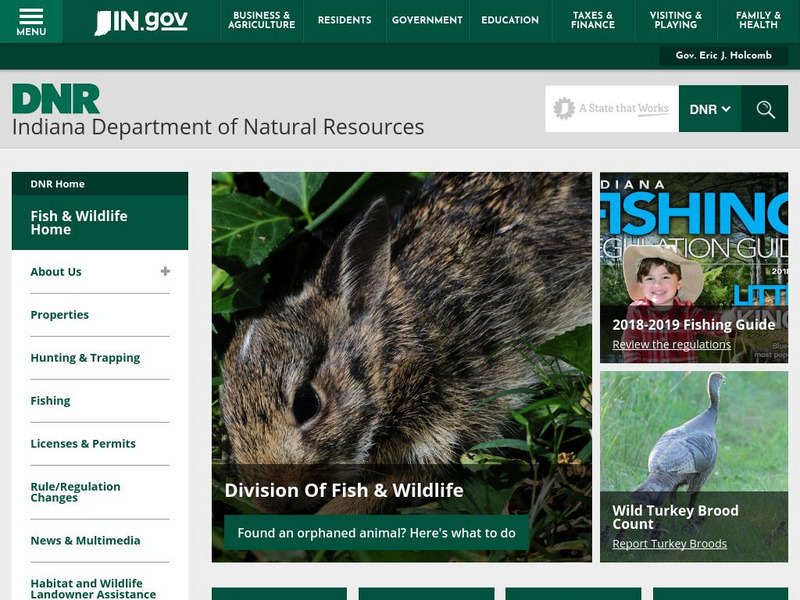Hi, what do you want to do?
Alabama Learning Exchange
Alex: Habitats
What is a habitat? In this lesson, students will identify that a habitat has four elements, food, water, shelter, and space. Students will identify their own habitat and create a brochure describing the habitat in terms of food, water,...
Utah Education Network
Uen: Animals in the Ecosystems
Write about animal contributions to their environment.
Alabama Learning Exchange
Alex: Beanie Baby Habitats Collaborative Project
With the booming market of "Beanie Baby" type stuffed animals being so prominent in students' lives, this project brings that interest into the classroom through the use of research, science, hands-on experiences, and technology. The...
Alabama Learning Exchange
Alex: Tad the Tadpole
Tad the Tadpole is designed to demonstrate how pollution in various areas affects wildlife in their native habitats. The lesson is designed to stress the importance of conservation for animals and their surrounding environment. Upon...
EL Education
El Education: Local Habitat Survey and Animal Research
Students observe animals in several habitats and then choose one animal to research. Students learn about physical adaptations that help each animal live successfully in its habitat and then draw a picture of their animal which is later...
Alabama Learning Exchange
Alex: Animal Studies
This was a collaborative effort between Melanie George and Connie Roan. Students will work in collaborative groups and investigate animal characteristics, their habitats and basic needs using the Internet and library. They will then make...
Alabama Learning Exchange
Alex: Creature Comforts
What do living things need to survive? In this unit, learners explore different habitats and the adaptations made by living things to survive. Students will create a website matching an animal's adaptations to its environment. Then, they...
Other
Brooklyn Expedition: Structures
If you've ever wondered how animals use their homes or what we are made of, this is the place to look. This site from the Brooklyn Children's Museum explores the shared characteristics among animal skeletons and homes, architecture, art...
TeachEngineering
Teach Engineering: Biodomes
Students explore the biosphere's environments and ecosystems, learning along the way about the plants, animals, resources and natural cycles of our planet. Over the course of lessons 2-6, students use their growing understanding of...
TeachEngineering
Teach Engineering: Got Energy? Spinning a Food Web
Students learn about energy flow in food webs, including the roles of the sun, producers, consumers and decomposers in the energy cycle. They model a food web and create diagrams of food webs using their own drawings and/or images from...
ClassFlow
Class Flow: Interdependence and Adaptation
[Free Registration/Login Required] In this lesson, children extend their knowledge of the way in which plants and animals in different habitats depend upon each other and are suited to their environment.
Scholastic
Scholastic Explorers: Endangered Ecosystems
A great site with something for all grades. Do research on rainforests, follow field research on animals in Latin America, and show what you know through interactive assessments. Lots to see on this site which is a collaboration of...
Other
Shunya's Site: Cheetah
A brief overview of cheetah's size, characteristics and habits are listed on this site. It also provides 20 high quality images of cheetahs in their habitats.
The Wonder of Science
The Wonder of Science: K Ess2 2: Environmental Change
This NSTA vetted source includes resources to teach how plants and animals (including humans) can change the environment to meet their needs. Included are assessment ideas, videos, examples, lesson plans, and photos of student work.
Other
Welcome to Biodiversity Hotspots
Conservation International offers this extensive look at some of earth's most vulnerable areas. Some of the most remarkably diverse places in the world also prove to be some of the most threatened. Learn more about the efforts in place...
Encyclopedia of Earth
Encyclopedia of Earth: Evolutionary Biology: Amphibian Ecology and Evolution
Information about amphibians, animals that can survive in a wide variety of habitats and cli-ates. The article discusses their behavior, diet, predators, conservation status, and evolution. (Published: August 29, 2008)
Other
The Antlion Pit: A Doodlebug Anthology
Outlines the physical characteristics of the antlion order, Neuroptera. Identify them by their size, relationships with other animals, and about the antlion's role in certain cultures.
PBS
Pbs Teachers:manu: What's Happening to My Species?
Learn about animals from Manu, create a mask depicting a selected animal and role play that animal. Discuss the selected animals and the threats to their survival in the Manu rainforest.
Ducksters
Ducksters: Birds for Kids
Kids learn about birds and their habitats and different types. What makes an animal a bird? How do they fly?
San Diego Zoo Global
San Diego Zoo: Alligators & Crocodiles
This resource provides detailed facts about alligators and crocodils, including how to distinguish between a crocodile and an alligator, information on their eating habits, how a mama crocodile protects her young, and more. There are...
TVOntario
Tvo Kids: Games: Animal Where?
Complete this puzzle game by clicking and dragging animals to place them in their habitat.
Science Education Resource Center at Carleton College
Serc: Habitat Part 1
Students investigate creatures living under a rock and then present their findings on a class display and writing in a journal.
Other
Nh F&w: Nongame and Endangered Wildlife Program
New Hampshire offers a problem/solution section of their conservation page that illustrates wildlife management challenges in varied habitats.
Other
Indiana.gov: Indiana State Division of Fish and Wildlife
Home of the State of Indiana's Division of Wildlife. This resource is small, but does offer a photo gallery and some information about the animals that can be found in Indiana. It also gives information about three current restoration...



























